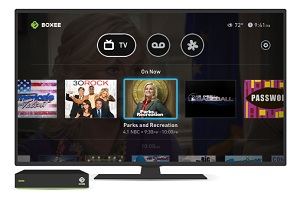Comcast Begins to Connect to Boxee's Cloud DVR
The smarter way to stay on top of the multichannel video marketplace. Sign up below.
You are now subscribed
Your newsletter sign-up was successful

Comcast has begun to make available a new type of Digital Transport Adapter (DTA) that will feed an encrypted form of its basic digital video tier to Boxee's new Cloud DVR product.
Comcast is notifying eligible Boxee customers about the E-DTA in "select markets" where Comcast has begun to encrypt its "B-1" tier, a spokeswoman said. She didn't reveal those markets, but noted that Comcast intends to phase in B-1 encryption in additional cities over the comings months.
"We are beginning to proactively notify customers in select markets that we will begin to encrypt limited basic channels as now permitted by last year's FCC B1 Encryption Order," Comcast said, in a statement. "While the vast majority of our customers won't be impacted because they already have digital equipment connected to their TVs, we understand this will be a change for a small number of customers and will be making it as convenient as possible for them to get the digital equipment they may need to continue watching limited basic channels."
While most of those customers will get traditional DTAs, the newer version of the device, called an Ethernet-Digital Transport Adapter (E-DTA), will initially be targeted at the new Boxee product and support HD video as well as home networking capabilities. Its internal IP mini server turns encrypted QAM video channels into protected IP streams that can be shared with the Boxee device over connections outfitted with Digital Living Network Alliance (DLNA) technology with DTCP-IP content protection. It's an integrated security device, so there's no CableCARD interface.
The E-DTA became a central figure during U.S. cable's pursuit of new Federal Communications Commission (FCC) rules that now allow operators to encrypt their basic service tiers in all-digital systems, a decision that prevents CE devices from receiving a small subset of unencrypted "Clear QAM" channels in basic tiers that include the major broadcast stations. Cable argued that basic tier encryption would help operators clamp down on service theft and reduce truck rolls because it would enable MSOs to activate and deactivate services remotely in the most cases. The FCC basic TV encryption ban was lifted on Dec. 10, 2012.
To help get it, the largest six incumbent U.S. cable MSOs (Comcast, Time Warner Cable, Cox Communications, Charter Communications, Cablevision Systems and Bright House Networks), representing about 86 percent of all U.S. cable subscribers, agreed to let IP-based retail devices receive basic TV tiers without a CableCARD. Longer term, CE companies will also have the ability to license that technology and build it into their products.
Earlier on, Boxee and Comcast signed a separate agreement that focused on the E-DTA component that's now part of the FCC rule.
The smarter way to stay on top of the multichannel video marketplace. Sign up below.
Among other conditions outlined in the new rules, operators are also on the hook to provide existing customers who take only the basic tier a set-top or CableCARD for free for two years after encryption begins. Customers who receive Medicaid and only take the basic tier can get that equipment for up to two TVs without charge for five years.
Boxee VP of marketing Andrew Kippen noted in an email exchange that the company is still finalizing details with Comcast but "you should start to see the E-DTAs begin to appear over the next month" as Comcast begins to notify Boxee users about the encryption process.
It was not immediately known who will supply the initial batch of E-DTAs to Comcast. The MSO buys other types of DTAs from sources such as Motorola Mobility, Pace, Technicolor and Evolution Digital.
Importantly, the E-DTA will enable Boxee to access Comcast's basic TV tier while preserving the Boxee user interface. Boxee's newest product, the $100 Cloud DVR (formerly called Boxee TV), supports a family of apps, including Netflix and, as the name suggests, a cloud-based DVR. It can also receive free, over-the-air TV channels via a digital antenna. The Cloud DVR service is currently available in Atlanta, Chicago, Dallas, Los Angeles, New York City, Philadelphia, Houston, and Washington, D.C., according to the Boxee Web site. The free version provides five hours of DVR playback a month, keeps recordings for up to 90 days, and only allows DVR playback on a TV. The premium, $9.99 per month version offers unlimited and perpetual DVR storage, and lets users access recordings on TVs, PCs, tablets and smartphones.
A Boxee spokeswoman confirmed that only the Boxee Cloud DVR (not the original Boxee Box) is eligible for the new E-DTA.
